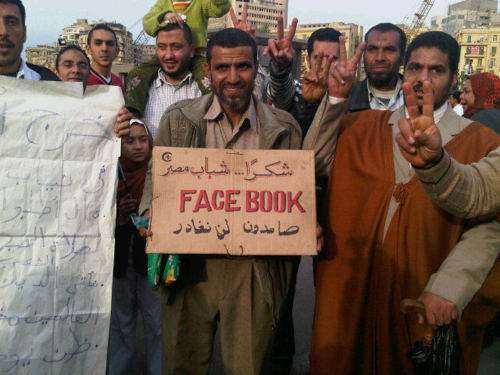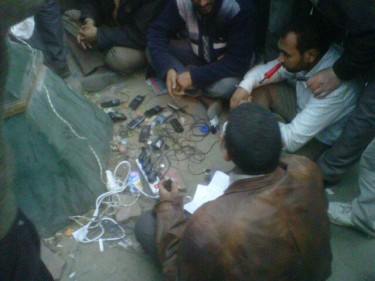Social media is growing as fast as the people themselves are growing. But social media cannot be held responsible, or praised as the sole motivator or leader of the Egyptian revolution in January and February this year. Its involvement was certainly a paramount aspect, but it must be made clear that it was complimentary rather than core. (Brisson, 2011) The motivation for the protests were the same as ever - the political context and years of oppression - but it was social media that encouraged connections and facilitated logistics. It was the underlying force for the rapid and powerful change that took place.
 |
| Source |
The same people and stories have provided the ‘fuel’ for democratic change, but in Egypt, it was the social media that acted as the spark. Using online platforms, people could feel a part of the growing community, no matter their location and without fear of oppression. I for one experienced the buzz that was brewing in the cyber world. Facebook and twitter were no longer the social networking sites that I used in the USA; they had become meeting places for people with a common interest and goal – freedom. But as important as the online community has become for advocacy and recruitment, it is the cooperation with offline organisation that is so incredibly important. Leading up to, and during the protests, sensitive organisation was carried out in an analog fashion with leadership gatherings where handwritten organisation documents were dispersed.(Brisson, 2011) Along with this organised cooperation, the natural cycle of communication is important to note. Egyptian people are incredibly social and the knowledge being transferred on street corners, in cafes and from roadside newspaper vendors is happening at a tremendous rate. ‘It is this offline interaction that provides much of the fodder for connections happening online.’ (Brisson, 2011)
| Egyptian anti-government protesters in Alexandria (source) |
However the problem with social media during an uprising is the lack of leadership. In the past, a strong leader or leadership team have provided the backbone and direction for the revolution. In Egypt, we had no distinct leader. There were people like Kahled Said and Wael Ghonim, but they weren’t our leaders. They were just individuals amongst a sea of others. I am not downplaying their importance in motivation, but I am just making clear that it was everyone’s individual stories and drives that came together and created such a strong spirited nation. There were also the people who coordinated offline meetings and dissemination of information, but we still lack the traditional, hierarchical structure that was present in the revolutions before us. (Vila, 2011) With the ousting of President Mubarak, there is no clear ‘political leadership to fill a vacuum of power within our ranks.’ (Vila, 2011) However, our lack of leadership proved to be a double edged sword for the authorities. When they attempted to halt the protests by turning off the internet, they only sparked more anger and motivation with thousands of keyboard activists flooding the streets.
However, the online community is seemingly restrictive. It could be argued that the young and educated are the only ones utilising it, leaving the rest of the population in the dark. But this is far from the truth. In Tahrir Square on the first of February, ‘hundreds of thousands, some estimates say over a million, packed the square in a show of solidarity with fellow protesters’ (Elshaded, 2011) and called for the regime of Mubarak to fall. ‘Never before have I seen as diverse a representation of Egyptian society assembled in a single public space in Egypt as the crowd that gathered that day demanding in unison their universal freedoms.’ (Elshahed, 2011) This is because the online conversation that was brewing was recognised by all, even those who had never been on the internet. Technological tools have become culturally important (Brisson, 2011), providing aspiration and hope in the emerging ideas surrounding their impact. The importance of social media boils down to its ‘ability to impact a people’s consciousness as much as their physical realities.’ (Vila, 2011)
 |
| This man’s sign reads: ‘Thank you Egyptian Facebook Youth’ (Source) |
The feeling of unison and connection that technology fosters is also directly linked to national identity and a sense of ownership over the events that were unfolding. During the protests, mobile phones had become “tools for crafting the revolution’s narrative” (Brisson, 2011) and shaping the stories that will live on for generations to come. My friends and fellow Egyptians have this same view - it was our revolution because we made it happen, and it will stay our revolution because we will be the ones writing its history. (Fahim, 2011)
 |
| Improvised recharging of phones in Tahrir Square (source) |
Social Media has without a doubt played a paramount complimentary role in the recent Egyptian protests. It has allowed people to unite via another means, fostering conversation that does not depend on demographic or location. While the lack of leadership is certainly an issue, in Egypt’s situation it turned out to be one of the most important marks of the movement. The air of aspiration around the use of technology in Egypt also proved to be as powerful as the technology itself. While social media did played an important role, it is important to remember that ‘as an amplifier of human intent, technology will only be as only as effective as the offline social networks it is built upon, and only as good as human intent is able to direct it.’ (Brisson, 2011)

Revolutionaries and political contexts cause a revolution, and they succeed or fail for reasons that inevitably transcend their tools.
ReplyDelete@MarcusO'Donnell - Of course ‘Revolutionaries and political contexts cause a revolution’ however I believe that the tools in place have a definite impact on the speed and logistics of the revolution, which may subsequently affect the success.
ReplyDeleteI don’t know about Egypt, but in Iran there were ‘only 19,235 Twitter accounts registered in Iran (0.27 perecent of the population on the eve of the 2009 elections’(Sysomos, 2009)
ReplyDelete@Anonymous - It was the most documented political action in history Over 30GB of raw footage from jan25. That's saying something!
ReplyDelete@Anonymous - I know for a fact that between 2000 and 2010, the percentage of internet users in Egypt has risen by 1,825.3 percent (Jones, 2011). How many of these people are connected to social networking platforms I do not know, but such an increase is phenomenal and the impact on people’s consciousness is evidence in itself that technology is playing a role.
ReplyDeleteThe Internet as a whole should win the Nobel Peace Prize this year for all it’s done for democracy in the MENA region.
ReplyDelete@PaulBurgess - But it's too soon to rejoice. Hitler won in a democratic election and outlawed all other political parties soon after - with enthusiastic support from the people.
ReplyDelete